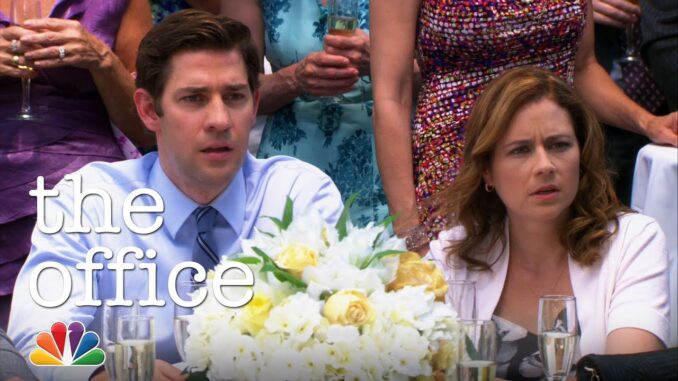
The clinking of champagne flutes was the usual soundtrack to an office wedding. A thin, reedy cover band mangled a power ballad in the corner, and the sticky dance floor hummed with the predictable gyrations of Dunder Mifflin employees. Michael Scott was undoubtedly attempting a dramatic toast, Dwight Schrute was probably analyzing the structural integrity of the cake, and Pam Beesly was exchanging a knowing, gentle smile with Jim Halpert across the room. It was, in short, business as usual – a familiar, if slightly off-key, symphony of ordinary lives.
And then there was Roy. Roy Anderson. Pam's ex-fiancé, the burly, unadorned warehouse foreman whose presence at any social gathering was usually a stoic, sometimes surly, punctuation mark. He was a man of concrete, of forklifts, of blunt, unvarnished truth. His lexicon did not include sonnets, his typical vocal range was limited to shouts over machinery or the occasional gruff laugh. To imagine Roy engaging in any act requiring grace, vulnerability, or — heaven forbid — melody, was akin to picturing a cinder block taking flight. His invitation to the wedding, whether out of courtesy or a lingering sense of shared history, felt like an obligation, a necessary but slightly awkward inclusion. No one expected him to do anything but perhaps nurse a beer and eventually slip away.
So, when the MC, perhaps on a dare or a whim of well-intentioned foolishness, called Roy's name to the makeshift stage, a ripple of collective, incredulous silence spread through the room. Forks paused mid-air. Conversations died on lips. Michael, mid-sentence about the true meaning of love (probably plagiarized from a greeting card), choked. Roy, surprisingly, rose. There was a moment of awkward hesitation, a shrug, a glance at Pam that was too brief to decipher, and then he was at the microphone. The band, bless their bewildered hearts, struck up a slow, bluesy intro – something mournful, something unexpected.
And then Roy sang.
It began as a rumble, a low, earthy vibrato that seemed to rise from the very floorboards. It wasn't polished, not technically perfect like a studio recording, but it was raw, it was honest, and it was glorious. His voice, previously only known for its volume, unfurled like a banner, rich with an unexpected depth, a soulful timbre that carried the weight of experience. It was a blues song, perhaps, or an old country ballad – something about love lost and found, about longing and hope. He wasn't performing; he was feeling. Every word was etched with a sincerity that was startling, every note resonant with a power that transcended the cheap PA system. The voice that usually barked orders in the warehouse now soared, effortlessly, filling the space with an emotion so pure it was almost uncomfortable.
The office was stunned. Truly, utterly stunned. Pam's eyes, usually so expressive, were wide and unblinking, reflecting a mix of shock and a quiet, almost tender, understanding. Jim, whose usual response to office absurdity was a wry smirk, simply stared, his jaw slack, a subtle nod of respect slowly forming. Even Angela Martin seemed to thaw, her perpetually pursed lips softening, if only infinitesimally. Dwight, ever the pragmatist, probably began to re-evaluate his entire threat assessment of Roy, noting this new, uncatalogued skill. It wasn't just that Roy could sing; it was that he sang with such unexpected beauty, such profound vulnerability. It was as if the office had been looking at a two-dimensional cutout of Roy for years, and suddenly, he had stepped forward, revealing a hidden dimension, a secret chamber in his soul they never knew existed.
The final note hung in the air, vibrating long after he had pulled away from the microphone. For a moment, there was no applause, only the collective exhale of a room that had held its breath. Then, a crescendo of cheers erupted, louder and more genuine than any the wedding had yet produced. Roy, almost shyly, gave a small nod, a half-smile, and returned to his table, the warehouse foreman once more. But he wasn't just the warehouse foreman anymore. He was the man who had sung, who had cracked open a window into an unexpected depth, reminding everyone in that ordinary office that even the most seemingly predictable lives hold hidden talents, unvoiced passions, and the profound capacity to stun. The wedding continued, but the air was different, charged with the lingering echo of an unlooked-for revelation, a beautiful disruption that forever altered the office's collective perception of Roy Anderson.
